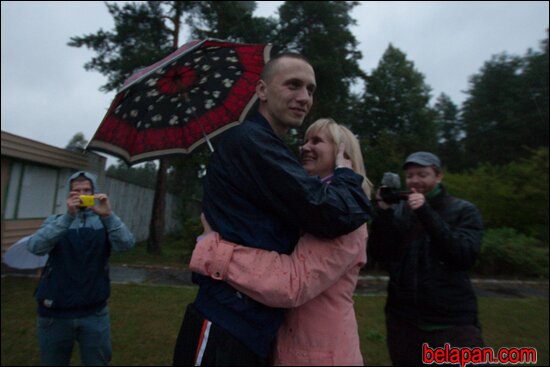
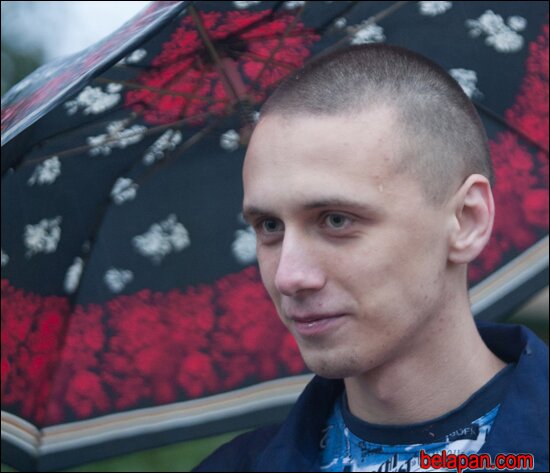
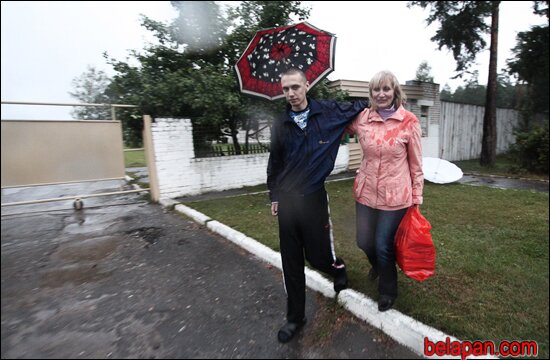



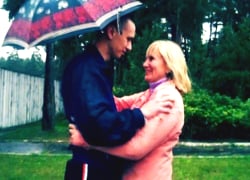
He will be under police supervision for 6 months after the release.
Aliaksandr Frantskevich, who served his term in correctional colony No. 22 in Ivatsevichy, was released early in the morningof 3rd of September. His mother and activists of opposition organisation met him outside the prison. He will go to Navapolatsk to register with the police.
Frantskevich was arrested in connection with the “anarchist case” on September 3, 2010.Ihar Alinevich, Mikalai Dziadok and him were tried in the Zavadski distirict court on May 27, 2011.
The activist was charged with violating part 2 of article 351 of the Criminal Code (deliberate destruction of computer information) and part 2 of article 339 (hooliganism). He was charged with carrying out attacks on government buildings and hacking the website of the Navapolatsk city executive committee. He pleaded not guilty at the trial.
Frantskevich was sentenced to 3 years in a medium security correctional colony. Belarusian human rights defenders declared him a political prisoner in September 2011. The activists served his term in correctional colony No. 22 in Ivatsevichy.
The political prisoner gave an interview to charter97.org on his way from a penal colony in Ivacevichy to Minsk.
Aliaksandr Frantskievich, who served the term in the colony number 22 in Ivacevichy, has been released today early in the morning. He was sentenced to three years in prison in May 2011 on the case of anarchists that made a lot of noise. Frantskievich, as well as other representatives of the anarchist movement Ihar Alienievich and Mikalaj Dziadok, was accused of organizing a series of arsons of administrative buildings. Despite the guilt had not been proven and the damage caused had been insignificant, the activists were sentenced to prison terms from three to seven years.
- Aliaksandr, congratulations on the release. The authorities by all means tried to present your, Mikalaj Dziadok and Ihar Alienievich’s case as a usual criminal case, which made many human rights organizations hesitate for long whether to call you political prisoners. How do you assess your arrest and the arrest of your comrades?
- The goal of the authorities was not find the guilty, but to neutralize the anarchist movement, regardless of what fighting methods we stick to. For example, that in the course of the process another suspect Maksim Vietkin was released, but me, Dziadok and Alienievich put in jail, says that the position that we stack to in court was more important as well as the corpus delicti that they tried to ascribe to us.
This an absolutely political case related exclusively to our political beliefs. We are convinced that there is a dictatorship in the country, and it should be fought. The more time I spent behind bar, the more I was getting convinced of that.
- Does it seem coincidental to you that you were arrest three months before the presidential elections?
- A catalyst for that was the attack on the Russian embassy. This had international resonance, Lukashenka claimed that Russian special forces were behind that. Of course, the approaching elections also played a role.
But had we been arrested not in September, we would have still ended up in prison in December together with all the oppositionists, arrested after the elections. Sooner or later this would have happened – with or without corpus delicti – in any case we would have ended up under the roller.
- There were allegations that your arrest before the elections and the nature of the charges were a special operation, planned in order to picture the opposition as radicals before the provocation on 19 December 2010.
- To a certain extent it was preparation for the elections. Although a bit different agencies were involved in our case. It was the organized crime department that dealt with the case’s major part, whereas it was less involved in the 19 December events. But, in principle, their goal was to stop our symbolic actions, which irritated the authorities and then completely stop civil activities in the country in general.
Personally I think that on 19 December 2010 the authorities did not only want to crush all the civil society. Lukashenka set the goal to keep his own nomenclature, his own bureaucracy submitted to him, as at some point they started considering him an insufficiently effective manager.
- What part did KGB play in your case?
- These were mainly organized crime department officers who spoke with me. But it was obvious that KGB supervised their work, oversaw how they managed to fulfill their duties.
- Did special service agents try to recruit you?
- Yes, at the investigation stage. Actually, my whole charges are based on that I refused to cooperate on the investigation. They demanded secret addresses, passwords, which I could not give them because of my principled beliefs, that is why I ended up in prison.
- Do you have any information about Ihar Alienievich? He was kidnapped in Moscow and sentenced to a tremendous term of 8 years in prison.
- Ihar Alienievich was a strong anarchist leader, he could speak convincingly, knew the anarchist theoretical base very well. This is what the charges against him were mainly based on.
In his book “Going to Magadan” Alienievich tells how special services tried to recruit him. This tells that special services simply wanted to use him for their own purposes, but when he refused to do that, they dealt with him shortly, trying thus to break him psychologically.
- Did you manage to communicate a little during the trial?
- Yes, during the trial Ihar personally told me how he had been kidnapped in Moscow. They were going for a meeting with one of our comrades, who turned out to had been recruited by special services. Ihar did not calculate it right, he thought that repressions would not reach him in Moscow, but it turned out that Belarusian authorities had quite long arms.
They were detained and taken to the border by car. Their detention was registered in a kilometer from Belarus-Russia border. According to the protocol, he was allegedly detained by some lieutenant.
- In three years of conviction you went through penal cells and prisons, you were deprived of parcels, newspapers, books and letters from relatives. Why did they treat you so harshly?
- To some extent it is connected with the pardon process, which Belarusian authorities started. To some extent – with the conflicts with the administration itself. All the influence methods, used against political prisoners, are known.
I repeatedly heard of what was going on with Mikalaj Statkievich, Ihar Alienievich. Such methods are used against everyone, who has principles, beliefs, is not going to be recruited or cooperate with the administration.
- How specifically did they demand to sign a plea for pardon from you?
- I was specifically suggested that I signed a plea for pardon two times. This was done by the colony’s head. He said that otherwise I had to spend the whole imprisonment term, which actually did happen. Then, as the pressure started, they hinted at that: everything that was going on with me was related to my having to sign a plea for pardon.
This was done if not by the representatives of the administration, then by their agents among the prisoners.
- How did these agents act?
- They created unbearable conditions around me. Not all the prisoners openly cooperate with the administration, some do that in secret and have the trust of other prisoners. They tried to create artificial isolation around me, deprive me of the possibility to fully communicate with anyone and thus break me psychologically.
- What help you to hold on all these three years. You went to prison as a 20-year old boy.
- My beliefs and principles, my comrades, who constantly supported me. I have kept my beliefs and am not going to refuse from them.
- Mikalaj Statkievich reported that the authorities try everything in their attempts to break political prisoners, up to rape threats.
- They did not threaten me personally with that, but I believe that Statkievich’s situation is very complicated, because as for today he is the only presidential candidate in prison, he has quite a principled position, he has a strong influence in the media and, of course, this strongly irritates Lukashenka and his entourage.
- Now you’ll be under supervision for half-a-year. What does it imply?
- I have to be at home from 10 p.m. to 6 a.m., inform police if I move to another place of residence, do not leave the district without police department’s approval. I cannot go to bars, restaurants, places, where they sell alcohol, although this ban is quite weird, since I do not drink alcohol at all.
- What are your nearest plans at large?
- I am going to Minsk now. There I will make a job agreement. After a short adaptation period at home in Navapolatsk I will come back.
I will be living in Minsk, participate in the anarchist movement, work and provide for myself in some way.
I started writing in prison. At some point I thought that I the time had to be spent intelligently. I had long had the idea to write sci-fi stories, take up on literature. Now I am interested how readers will perceive that.
Photo: Nasha Niva
Sourcehttp://charter97.org/en/news/2013/9/3/74985/
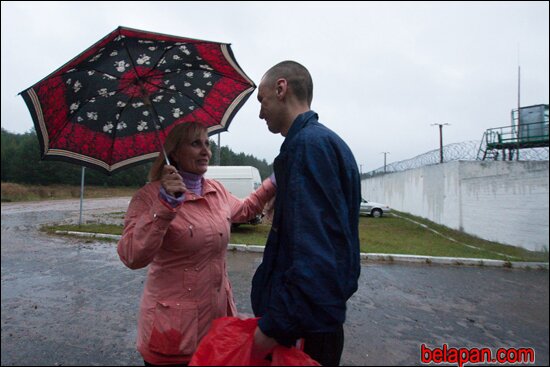
June 11th is the International Day of Solidarity with Marius Mason & All Long-Term Anarchist Prisoners. This action day has a long history, it was organized first time 20 years ago in 2004. In the first year, we managed to paint a graffiti to wall of one of the most guarded objects of Moscow,...
Anarchist group ANA Regensburg hosted my online-presentation on 16th of May 2024, in which I discussed tactics of anti-war activism in Russia, and reasons why the anti-war movement has not been able to make an impact to change the course of events yet. Cases of anarchists repressed for anti-war...